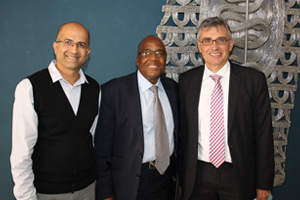Universal healthcare is achievable
01 April 2014 | Story Yusuf Omar. Image Charl Linde.
Speaking at a discussion hosted by UCT's School of Public Health and Family Medicine on 26 March 2014, Minister of Health Dr Aaron Motsoaledi shed light on his proposal for universal healthcare for all South Africans - National Health Insurance (NHI).
Drawing on global examples that demonstrate a shifting attitude towards the provision of universal healthcare and education, regardless of whether the state defines itself as capitalist or communist, Motsoaledi spoke of how the majority of European countries use a public-funded health system. With this model, most of citizens' healthcare spend comes in the form of mandatory pre-payment - the basis of the NHI - with voluntary pre-payment (medical aid schemes) and cash payments making up relatively nominal proportions of the total. (Editor's note: The data demonstrating this funding model is drawn from a paper by UCT's Professor Diane McIntyre.)
What South Africa needs to achieve universal healthcare, Motsoaledi explained, is infrastructure, inter-ministerial collaboration, and a robust healthcare financial system - one of six World Health Organisation (WHO)-defined 'building blocks' of a healthy healthcare system. He then went on to explain why similar plans have failed in recent decades in post-colonial African countries, and assured the audience that his department would learn from those mistakes - not repeat them .
Read about this discussion in more detail in the April edition of the Monday Monthly.
 This work is licensed under a Creative Commons Attribution-NoDerivatives 4.0 International License.
This work is licensed under a Creative Commons Attribution-NoDerivatives 4.0 International License.
Please view the republishing articles page for more information.










